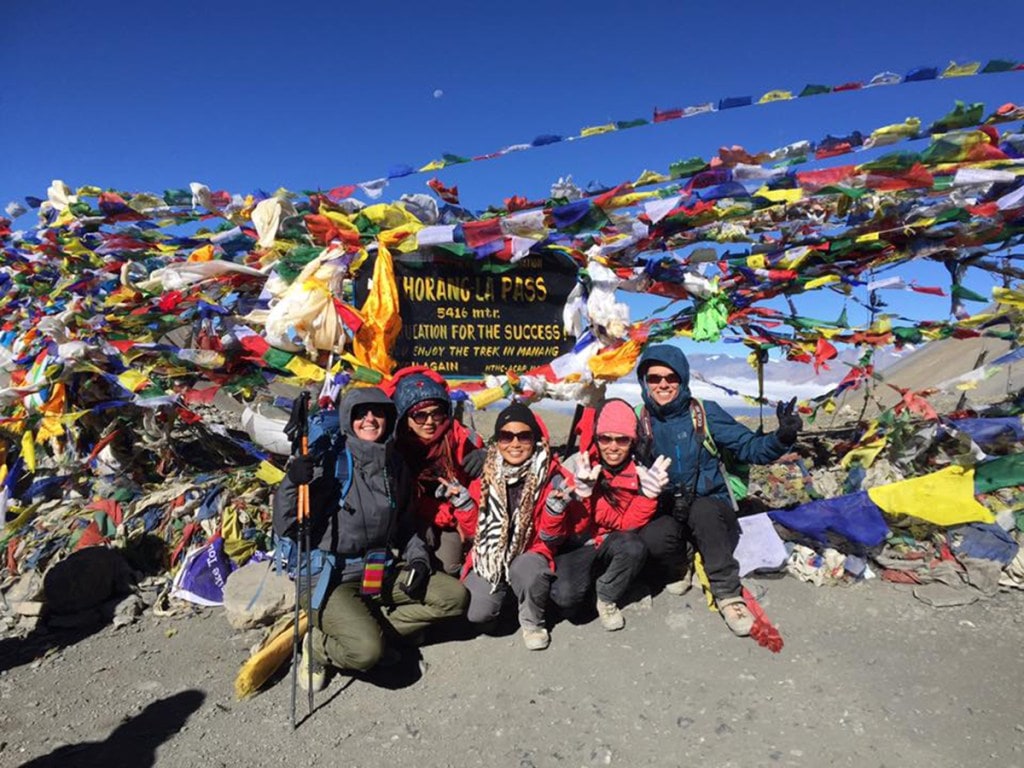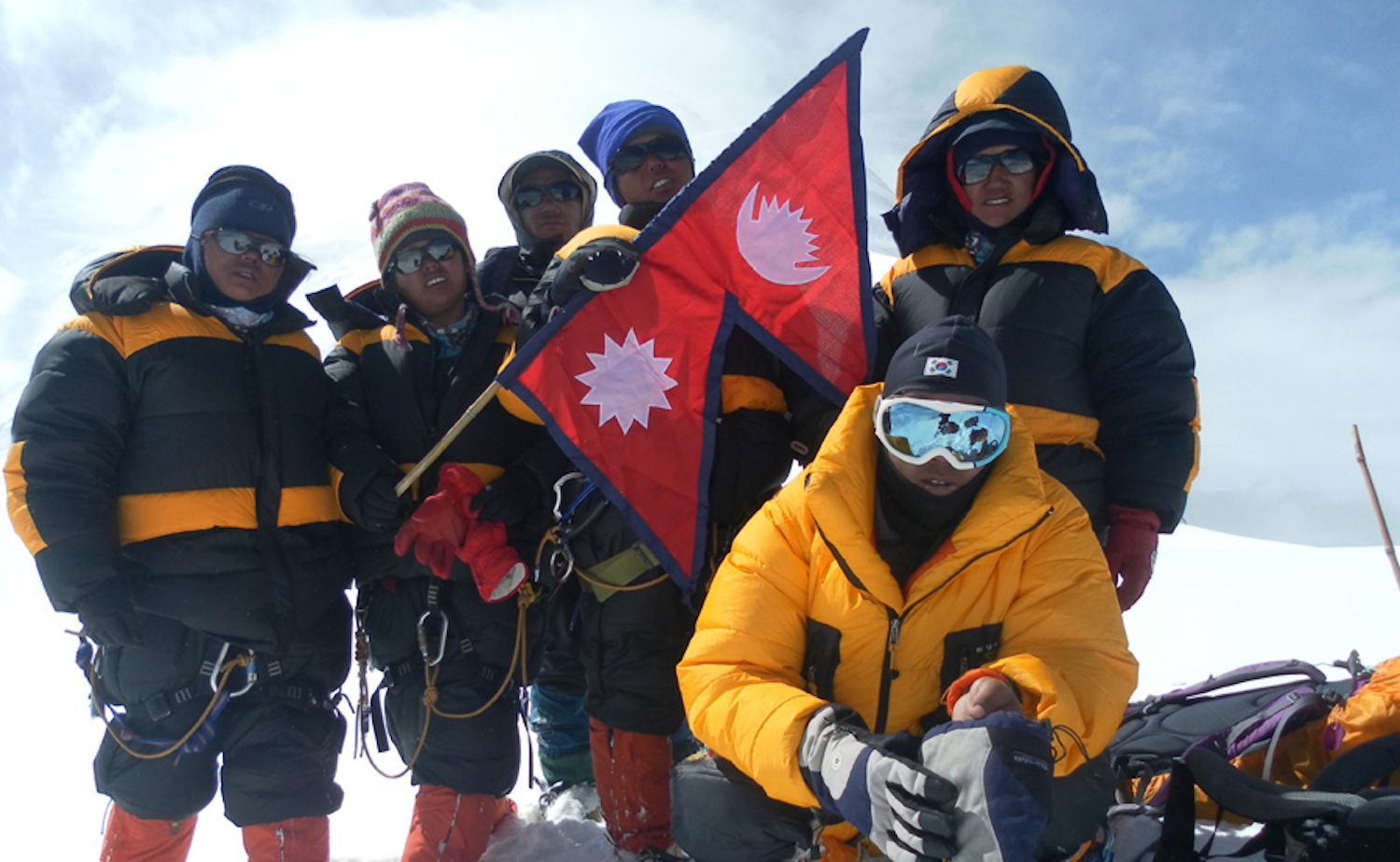In the Nepalese Himalayas, the Chhetri sisters are empowering local women and revolutionizing the trekking industry—one female guide at a time.
In the early 1990s, following the death of their father, Lucky, Dicky and Nicky Chhetri moved from India to Nepal. In the central Nepalese city of Pokhara, a gateway to the Annapurna Circuit, the Chhetri sisters opened a restaurant and lodge to serve those trekking in the Himalayas.
At the time, men dominated the local mountain guide industry. In Nepalese society, women were and, in many communities, still are expected to stay home. It was unheard of for a woman to be adventuring outside her home, let alone leading treks in the mountains.
In running the restaurant and lodge and meeting women from around the world, it didn’t take long for the Chhetri sisters to see that something had to give with societal beliefs and the male-dominated mountain guide industry.

The Chhetri sisters
As tourists passed through Pokhara, Lucky, Dicky and Nicky too often heard stories about male guides abusing their position with female tourists. Lucky says, “Some women were having bad experiences with their guides. These women were frightened and would tell us it felt unsafe to continue trekking with them.”
The more the Chhetri sisters heard troublesome stories from female tourists, the more they considered their role in the solution. “These stories touched us,” Lucky says, “and we resolved to do something. With urging from our family and friends, we gathered up all our courage and entered into this uncharted territory.”
As three foreign women looking to train and employ local women as trekking guides, Lucky, Dicky and Nicky caused a stir in Pokhara.
In 1994, the Chhetri sisters founded Empowering Women of Nepal (EWN) and 3 Sisters Adventure Trekking Company. EWN is a nonprofit organization that supports and trains local women to become female mountain guides. 3 Sisters is a company that employs female mountain guides to lead treks in the Himalayas. Both the organization and the company aim to empower and improve the lives of Nepali women.
As three foreign women looking to train and employ local women as trekking guides, Lucky, Dicky and Nicky caused a stir in Pokhara and the surrounding communities. “We were strangers to them. They were thinking, ‘Who are these strange women doing these weird things?’ We felt like aliens,” Lucky says. “It was very difficult for us to mix with the community. If we had come without any mission like that [to train and employ women], we would have fit in with them very easily, but because we had a different mission, people kept us at a distance.”
As such, getting EWN and 3 Sisters off the ground took time, patience and perseverance. In the beginning, the Chhetri sisters went out into Pokhara and the surrounding communities to let people, particularly women in rural areas, know the opportunity to be trained and employed as mountain guides existed. Then, as women went through the training and gained employment, other women were inspired to join EWN and 3 Sisters.
“I am walking on a happier and independent path where I feel equal to the people around me.”
Because working outside their homes is a new experience for most of the women who come to EWN and 3 Sisters, Lucky says another challenge they’ve encountered is a lack confidence. “The women who would come, they had nothing,” Lucky says. “They had a big social disadvantage. Most of them come from a low caste. They have a broken family, they have no education and they have lots of fears. They didn’t trust themselves.”
Lucky, who studied mountaineering at the Himalayan Mountaineering Institute in India in 1990, sees herself in these women. “Mountaineering training was eye-opening. [It allowed me] to find my own strength,” she says.
In sharing their stories and leading EWN and 3 Sisters, Lucky, Dicky and Nicky are inspiring and encouraging the women who join them to discover their own self-confidence and self-reliance.
Tul Devi Paija, a 3 Sisters mountain guide, says, “It was beyond my imagination to become a tour guide. After I met Lucky Chhetri, I felt like I could do it. She told me nothing was impossible, and I was inspired by her. The belief that women can’t be tour guides has been broken by my life. Now, I am walking on a happier and independent path where I feel equal to the people around me.”

Guide Tul Devi Paija and clients
The women who join EWN go through a monthlong classroom training program. They learn about safety, trekking, tourism, the English language, and religious and cultural differences. All the while, EWN provides emotional support, helping the guides-in-training gain self-confidence and independence. Following the classroom education, those who wish to move forward go through six months of job training with 3 Sisters, where experienced mountain guides mentor them.
Due to familial and societal beliefs, the road to EWN and 3 Sisters is often tough for the women who wish to break tradition and pursue careers in the mountain guide industry. “Working as trekking guide is more challenging for me because my family thinks that it’s only for men. I seek success to show them that women can do the work done by men, too,” says 3 Sisters mountain guide Gum Maya Tilija. “Before, I didn’t have much confidence in talking with people. Now, I have a lot of confidence, and my parents are very proud of me.”
For some, even once the familial battles are won, the fight to break into the industry still isn’t over. Female mountain guides often face scrutiny and, in some cases, abuse from their male counterparts. “When I started trekking, some men tried to discourage and disturb me in my job,” says Nirma Rai, another company guide. “They questioned me a lot. ‘Can you do this job? This job is for men, not for women. Women cannot handle this job.’ And I replied to them, ‘You men are physically stronger than women. It is natural. But I am mentally strong and maybe better at some skills than you.’ I know what I do. I didn’t care what they were telling me.”
Women who were once isolated are now gaining skills, jobs and improving their lives. They’re in control of their futures and challenging long-held beliefs.
Despite criticism, the success of EWN and 3 Sisters continues to build. Since 1994, nearly 2,000 women from all over Nepal have completed EWN’s training. Some have become the first women to summit mountains in the Himalayas. Many EWN trainees have become guides or assistant guides with 3 Sisters and other trekking companies in Pokhara and Kathmandu. Others have started their own businesses within the trekking and tourism industries. Some are studying and working in Pokhara, while others are doing so abroad. Other trainees have returned to their villages and are actively working in their communities in health, education and female empowerment.
3 Sisters currently employs more than 100 women, ages 18 to 40. Women who were once isolated are now gaining skills, jobs and improving their lives. They’re in control of their futures and challenging long-held beliefs.

Guide Durga Laxmi
“Life is up and down, just like a mountain, but I never give up hope. So much has changed in my life, and now, in my village, they are proud, but they don’t know what trekking is,” says 3 Sisters guide Durga Laxmi. “I want to go back and help them learn about trekking. I want to help the girls change their lives like I did.”
“Now, we can speak in the community. People know us and know that we are strong women.”
Of EWN and 3 Sisters’ many achievements, Lucky says, “the most important accomplishment for me is that we have been able to create a new profession for women. We are very happy that everyone has been exposed to this adventure-tourism area that was once really, really male-dominated. We are very proud of that.”
The change isn’t limited to the women and the local community. EWN and 3 Sisters have transformed Lucky, Dicky and Nicky as well. “We are becoming bolder,” Lucky says. “At the beginning, we were really afraid. We lacked confidence. But now, we can speak in the community. People know us and know that we are strong women.”

A 3 Sisters expedition
With more than 20 years of experience and proven success, the Chhetri sisters are now looking to expand EWN and 3 Sisters with an adventure sports training center in Pokhara. The goal: to provide more opportunities for women and men in Nepal. They see great potential in adventure tourism and want to become a leader in sustainable tourism in the country.
With an increasing demand for both EWN’s training and treks led by 3 Sisters mountain guides, their current space is limiting what they’re able to provide to local women and tourists. “We have a guest house here [at the restaurant and lodge in Pokhara], but it is very small,” says Lucky. “We need a space where people can concentrate. A space outside this area will be more affordable and within the community that we want to reach.”
The new training center will allow EWN and 3 Sisters to provide all services for trainees, mountain guides and guests in a single location. By 2018, the Chhetri sisters want to have purchased the land needed for the training center. Then, by 2020, they’re aiming to have the center built and ready for use.
What EWN and 3 Sisters have developed to date will be the strong foundation for continuing to service both the local community and tourists in a greater capacity.
“Come and trek with us. Empower these women. Support these women.”
Interested in learning more? You can find more information on supporting EWN and 3 Sisters here.
Beyond helping the organization financially, Lucky encourages you to join their female trekking guides for an adventure in the Himalayas. “Come and trek with us,” she says. “Empower these women. Support these women. It’s not only the economic support. It’s moral support, too. When you trek with us, you can see and feel the impact of our program. What we’re doing is life-changing for so many women in Nepal.”
[Ed. Note: Quotes have been edited for clarity and length.]
